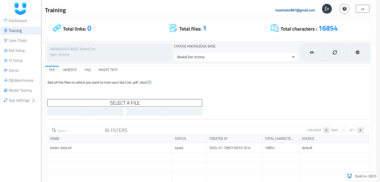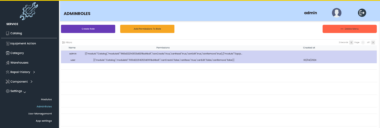plugged.in MCP Proxy Server

The Crossroads for AI Data Exchanges
A unified interface for managing all your MCP servers



 Overview
Overview
The plugged.in MCP Proxy Server is a powerful middleware that aggregates multiple Machine Conversation Protocol (MCP) servers into a single unified interface. It fetches tool, prompt, and resource configurations from the plugged.in App and intelligently routes requests to the appropriate underlying MCP servers.
This proxy enables seamless integration with any MCP client (Claude, Cline, Cursor, etc.) while providing advanced management capabilities through the plugged.in ecosystem.
 Key Features
Key Features
- Universal MCP Compatibility: Works with any MCP client including Claude Desktop, Cline, and Cursor
- Multi-Server Support: Connect both STDIO (command-line) and WebSocket (HTTP-based) MCP servers
- Namespace Isolation: Keep joined MCPs separate and organized with proper prefixing
- Multi-Workspace Layer: Switch between different sets of MCP configurations with one click
- Simplified Architecture: Streamlined codebase with improved startup time and reduced complexity
- API-Driven Proxy: Fetches capabilities from plugged.in App APIs rather than direct discovery
- Full MCP Support: Handles tools, resources, resource templates, and prompts
- Custom Instructions: Supports server-specific instructions formatted as MCP prompts
 Quick Start
Quick Start
Prerequisites
- Node.js 18+ (recommended v20+)
- An API key from the plugged.in App (get one at plugged.in/api-keys)
Installation
# Install and run with npx
npx -y @pluggedin/mcp-proxy@latest --pluggedin-api-key YOUR_API_KEY
Configuration for MCP Clients
Claude Desktop
Add the following to your Claude Desktop configuration:
{
"mcpServers": {
"pluggedin": {
"command": "npx",
"args": ["-y", "@pluggedin/mcp-proxy@latest"],
"env": {
"PLUGGEDIN_API_KEY": "YOUR_API_KEY"
}
}
}
}
Cline
Add the following to your Cline configuration:
{
"mcpServers": {
"pluggedin": {
"command": "npx",
"args": ["-y", "@pluggedin/mcp-proxy@latest"],
"env": {
"PLUGGEDIN_API_KEY": "YOUR_API_KEY"
}
}
}
}
Cursor
For Cursor, you can use command-line arguments instead of environment variables:
npx -y @pluggedin/mcp-proxy@latest --pluggedin-api-key YOUR_API_KEY
 Configuration Options
Configuration Options
Environment Variables
| Variable | Description | Required | Default |
|---|---|---|---|
PLUGGEDIN_API_KEY | API key from plugged.in App | Yes | - |
PLUGGEDIN_API_BASE_URL | Base URL for plugged.in App | No | https://plugged.in |
Command Line Arguments
Command line arguments take precedence over environment variables:
npx -y @pluggedin/mcp-proxy@latest --pluggedin-api-key YOUR_API_KEY --pluggedin-api-base-url https://your-custom-url.com
For a complete list of options:
npx -y @pluggedin/mcp-proxy@latest --help
 Docker Usage
Docker Usage
You can also build and run the proxy server using Docker.
Building the Image
Ensure you have Docker installed and running. Navigate to the pluggedin-mcp directory and run:
docker build -t pluggedin-mcp-proxy:latest .
A .dockerignore file is included to optimize the build context.
Running the Container
Run the container, providing the necessary environment variables:
docker run -it --rm
-e PLUGGEDIN_API_KEY="YOUR_API_KEY"
-e PLUGGEDIN_API_BASE_URL="YOUR_API_BASE_URL"
--name pluggedin-mcp-container
pluggedin-mcp-proxy:latest
Replace YOUR_API_KEY and YOUR_API_BASE_URL (if not using the default https://plugged.in).
Testing with MCP Inspector
While the container is running, you can connect to it using the MCP Inspector:
npx @modelcontextprotocol/inspector docker://pluggedin-mcp-container
This will connect to the standard input/output of the running container.
Stopping the Container
Press Ctrl+C in the terminal where docker run is executing. The --rm flag ensures the container is removed automatically upon stopping.
 System Architecture
System Architecture
The plugged.in MCP Proxy Server acts as a bridge between MCP clients and multiple underlying MCP servers:
sequenceDiagram
participant MCPClient as MCP Client (e.g. Claude Desktop)
participant PluggedinMCP as plugged.in MCP Proxy
participant PluggedinApp as plugged.in App
participant MCPServers as Underlying MCP Servers
MCPClient ->> PluggedinMCP: Request list tools/resources/prompts
PluggedinMCP ->> PluggedinApp: Get capabilities via API
PluggedinApp ->> PluggedinMCP: Return capabilities (prefixed)
MCPClient ->> PluggedinMCP: Call tool/read resource/get prompt
alt Standard capability
PluggedinMCP ->> PluggedinApp: Resolve capability to server
PluggedinApp ->> PluggedinMCP: Return server details
PluggedinMCP ->> MCPServers: Forward request to target server
MCPServers ->> PluggedinMCP: Return response
else Custom instruction
PluggedinMCP ->> PluggedinApp: Get custom instruction
PluggedinApp ->> PluggedinMCP: Return formatted messages
end
PluggedinMCP ->> MCPClient: Return response
alt Discovery tool
MCPClient ->> PluggedinMCP: Call pluggedin_discover_tools
PluggedinMCP ->> PluggedinApp: Trigger discovery action
PluggedinApp ->> MCPServers: Connect and discover capabilities
MCPServers ->> PluggedinApp: Return capabilities
PluggedinApp ->> PluggedinMCP: Confirm discovery complete
PluggedinMCP ->> MCPClient: Return discovery result
end
 Workflow
Workflow
- Configuration: The proxy fetches server configurations from the plugged.in App
- Capability Listing: The proxy fetches discovered capabilities from plugged.in App APIs
tools/list: Fetches from/api/tools(returns prefixed names)resources/list: Fetches from/api/resourcesresource-templates/list: Fetches from/api/resource-templatesprompts/list: Fetches from/api/promptsand/api/custom-instructions, merges results
- Capability Resolution: The proxy resolves capabilities to target servers
tools/call: Parses prefix from tool name, looks up server in internal mapresources/read: Calls/api/resolve/resource?uri=...to get server detailsprompts/get: Checks for custom instruction prefix or calls/api/resolve/prompt?name=...
- Request Routing: Requests are routed to the appropriate underlying MCP server
- Response Handling: Responses from the underlying servers are returned to the client
 Integration with plugged.in App
Integration with plugged.in App
The plugged.in MCP Proxy Server is designed to work seamlessly with the plugged.in App, which provides:
- A web-based interface for managing MCP server configurations
- Centralized capability discovery (Tools, Resources, Templates, Prompts)
- Custom instructions management
- Multi-workspace support for different configuration sets
- An interactive playground for testing MCP tools
- User authentication and API key management
 Related Resources
Related Resources
- plugged.in App Repository
- Machine Conversation Protocol (MCP) Specification
- Claude Desktop Documentation
- Cline Documentation
 Contributing
Contributing
Contributions are welcome! Please feel free to submit a Pull Request.
 License
License
This project is licensed under the MIT License - see the LICENSE file for details.
 Acknowledgements
Acknowledgements
- Inspired by the MCP Proxy Server
- Built on the Machine Conversation Protocol
PluggedinMCP Server
Project Details
- VeriTeknik/pluggedin-mcp
- @pluggedin/pluggedin-mcp-proxy
- Apache License 2.0
- Last Updated: 4/16/2025
Recomended MCP Servers

MCP (Model Context Protocol) server for Weaviate


A Model Context Protocol (MCP) server that enables secure interaction with MySQL databases
Model Context Protocol (MCP) server for Kubernetes and OpenShift

a test
A Model Context Protocol server for Scrapybara

ClickUp MCP Server - Integrate ClickUp task management with AI through Model Context Protocol

MCP tool that lets Cline inquire about a code base

Agent-MCP is a framework for creating multi-agent systems that enables coordinated, efficient AI collaboration through the Model Context...

The MATLAB MCP server provides AI users with powerful scientific computing and data analysis capabilities. It allows users...

MCP server providing IP geolocation via IP-API.com. Free, no API key required.








